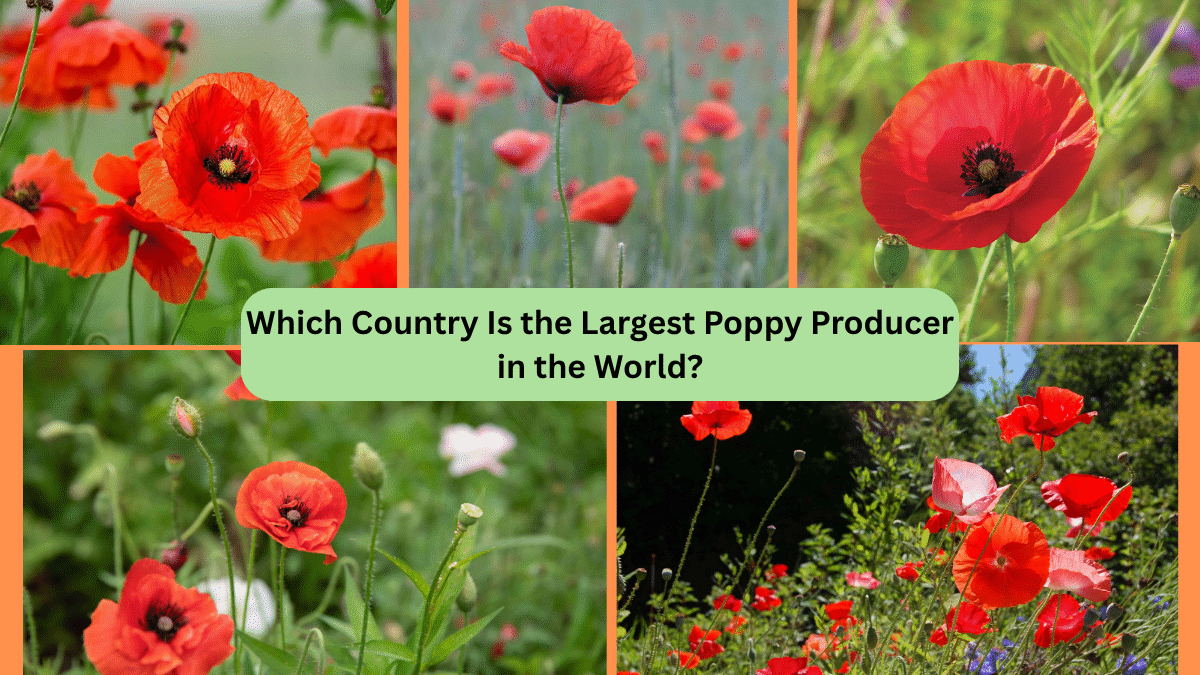The poppy flower — delicate, vivid, and historically significant — holds a unique position in both horticultural and cultural traditions worldwide. Known for its silky petals and brilliant hues of red, orange, pink, white, and purple, the poppy has long symbolized beauty, remembrance, and resilience. However, beyond its ornamental value, certain varieties of poppies are also cultivated for their seeds and medicinal alkaloids.
As poppy cultivation spans several continents for ornamental, culinary, and pharmaceutical uses, many wonder: which country is the largest poppy producer in the world? In this in-depth article, we’ll uncover the answer, explore the types of poppies cultivated, and look at the cultural, economic, and global significance of this iconic flower.
A Brief History of the Poppy

Poppies belong to the Papaveraceae family, which includes around 120 species found across temperate regions of the world. The most famous of these is the opium poppy (Papaver somniferum), cultivated historically for its medicinal properties, seeds, and ornamental value.
Poppies have been revered since ancient times:
- In Ancient Greece and Rome, poppies symbolized sleep and death but also resurrection.
- In China and Japan, poppies represented beauty and success.
- In the West, particularly after World War I, the red poppy became a symbol of remembrance for fallen soldiers, inspired by the famous poem “In Flanders Fields.”
Today, poppies are grown both for their stunning blooms in gardens and for practical uses, including culinary poppy seeds and pharmaceutical alkaloids.
Which Country Is the Largest Poppy Producer in the World?
When discussing poppy production, it’s essential to differentiate between:
- Ornamental poppy cultivation
- Seed production for culinary use
- Opium poppy production for pharmaceutical alkaloids
In terms of total cultivation area and production, Turkey is the largest legal poppy producer in the world for seeds and pharmaceutical purposes.
Why Is Turkey the Largest Poppy Producer?

Turkey has a long and regulated tradition of poppy cultivation, with government oversight ensuring controlled and legal production.
Ideal Climate and Soil
Turkey’s Aegean and Central Anatolian regions provide the perfect combination of dry summers, cool winters, and fertile soils, which are ideal for Papaver somniferum.
Government Regulation and Support
Poppy cultivation in Turkey is strictly regulated by the Turkish Grain Board (TMO) and the International Narcotics Control Board (INCB), ensuring that crops grown for pharmaceutical use are closely monitored.
Rich Agricultural Tradition
For centuries, Turkish farmers have cultivated poppies for medicinal, culinary, and cultural purposes. The country remains a major exporter of poppy seeds for food and of morphine-based products for global pharmaceutical markets.
Key Poppy-Growing Regions in Turkey
| Region | Notable Contributions | Special Notes |
|---|---|---|
| Afyonkarahisar | Largest poppy-growing province in Turkey | Name Afyon literally means “opium” in Turkish |
| Kütahya | Major pharmaceutical poppy cultivation | Highly regulated poppy fields |
| Uşak and Eskişehir | Poppy seed production for culinary use | Important for domestic and export markets |
Global Context: Other Major Poppy-Producing Countries

While Turkey leads in legal, regulated production, several other countries play important roles depending on the purpose — whether for cut flowers, culinary seeds, or pharmaceutical alkaloids.
| Country | Purpose | Notes |
|---|---|---|
| India | Pharmaceutical (under government control) | One of the few legal producers of medicinal opium |
| Australia | Pharmaceutical (Tasmania) | World’s largest producer of legal medicinal opiates |
| France | Culinary and ornamental | Major supplier of poppy seeds for European markets |
| China | Traditional medicine, ornamental | Cultivates poppies for cultural festivals and herbal use |
| Netherlands | Ornamental | Greenhouse-grown poppies for cut flower trade |
| Afghanistan (illicit) | Illicit opium poppy production | Largest illegal opium producer globally |
Commercial Uses of Poppies
Cut Flower and Ornamental Use
Poppies are popular in:
- Gardens and public parks
- Wedding bouquets
- Floral installations and home décor
They are appreciated for their airy petals and striking color palette.
Culinary Use
Poppy seeds are used in:
- Baking (bread, pastries, and bagels)
- Indian and Middle Eastern cooking
- Salad dressings and spice blends
Turkey, France, and Eastern European countries are major suppliers of culinary poppy seeds globally.
Medicinal Use
The Papaver somniferum species yields opium alkaloids like morphine, codeine, and thebaine, essential for producing:
- Pain relief medications
- Cough suppressants
- Sedatives
Countries like Turkey, India, and Australia produce opium poppies for strictly controlled pharmaceutical industries.
Cultural and Symbolic Value
In the UK, Canada, Australia, and New Zealand, red poppies are worn on Remembrance Day (November 11th) to honor soldiers lost in wars, a tradition stemming from World War I battlefields in Flanders.
Economic Importance of Poppy Production

Turkey’s poppy industry:
- Supports over 70,000 farming families
- Provides culinary seeds and pharmaceutical raw materials to markets in Europe, Asia, and the Americas
- Generates significant export revenues from both seeds and medicinal alkaloids
Global Demand
With rising demand for:
- Natural pain-relieving medications
- Ethically and legally produced poppy seeds
- Decorative flowers for floral design
Legal poppy farming continues to be a valuable agricultural and export commodity worldwide.
Challenges Facing Poppy Cultivation
Climate Variability
Poppies require specific growing conditions — dry and sunny summers with well-drained soil. Unpredictable weather patterns due to climate change threaten crop yields.
Pest and Disease Management
Fungal infections and pests like aphids and cutworms can damage poppy crops, requiring careful pest management strategies.
International Drug Regulations
Due to the opium alkaloids in Papaver somniferum, global trade and cultivation are heavily regulated. Farmers and exporters must comply with United Nations narcotics treaties and strict national licensing systems.
Market Competition and Substitutes
Synthetic opioids and alternative pain relief options could reduce pharmaceutical demand, affecting poppy production in the long term.
The Future of Poppy Cultivation

- Sustainable Cultivation Practices: Farmers are increasingly using organic fertilizers and eco-friendly pest control.
- Selective Breeding: Breeders are developing poppy varieties with lower narcotic content for culinary and ornamental use.
- Expanding Culinary Markets: Rising interest in artisanal baking and gourmet cooking is driving up global demand for high-quality poppy seeds.
- Cultural and Educational Tourism: Poppy farms and festivals, such as those in Afyonkarahisar, attract tourists for seasonal bloom displays and cultural exhibitions.
Conclusion
So, which country is the largest poppy producer in the world?
The answer is Turkey.
With its extensive cultivation of Papaver somniferum, strict government regulations, and leading global exports of poppy seeds and medicinal alkaloids, Turkey remains at the forefront of legal poppy farming. While countries like India, Australia, and France play important roles, none match Turkey’s scale, heritage, and diversified use of this fascinating flower.
As poppies continue to serve culinary, medicinal, ornamental, and cultural purposes, Turkey’s vibrant poppy fields are poised to retain their pivotal place in both the flower and pharmaceutical industries for years to come.






Leave A Comment